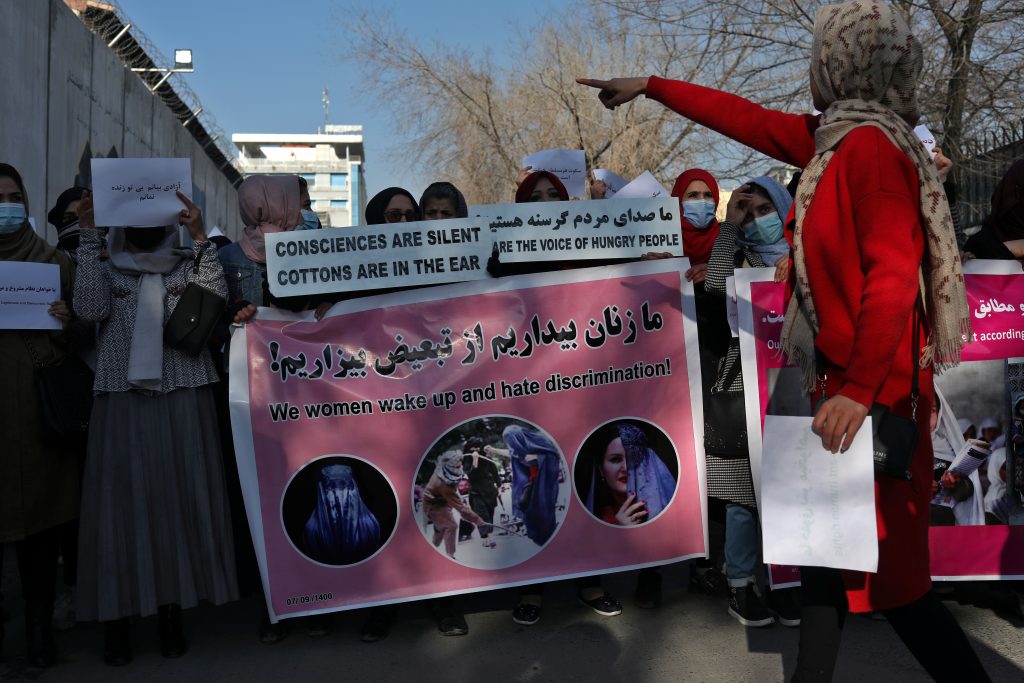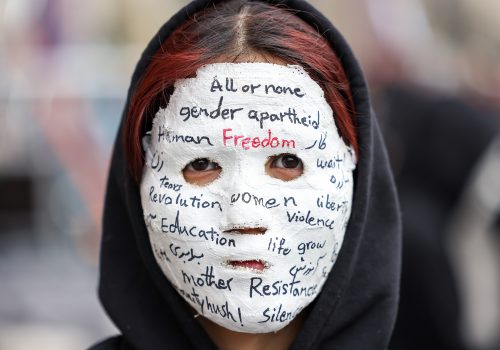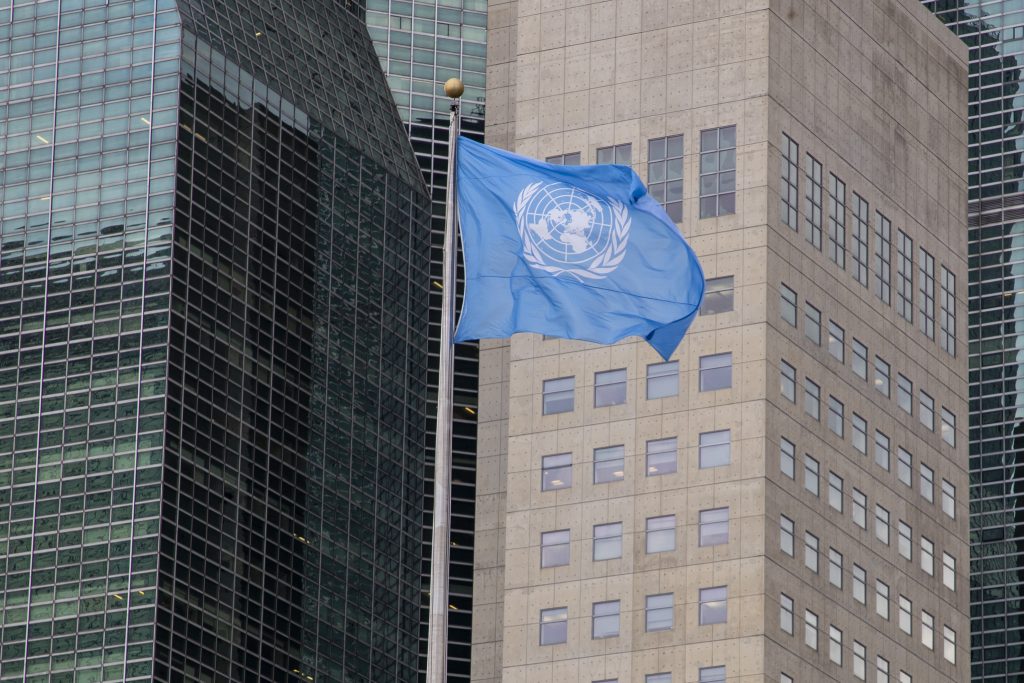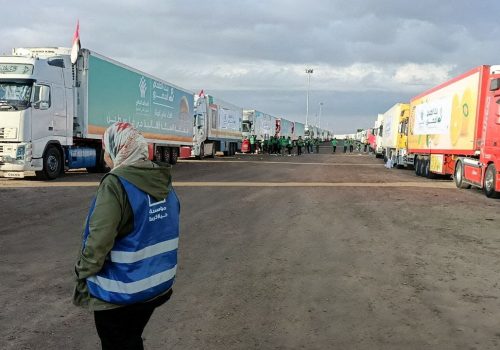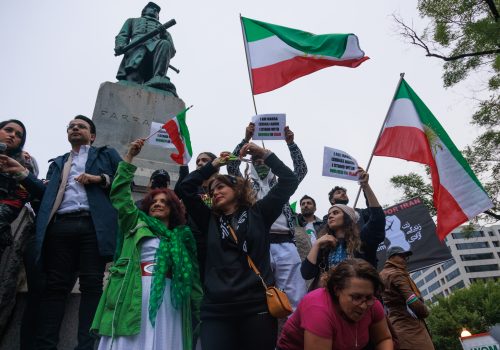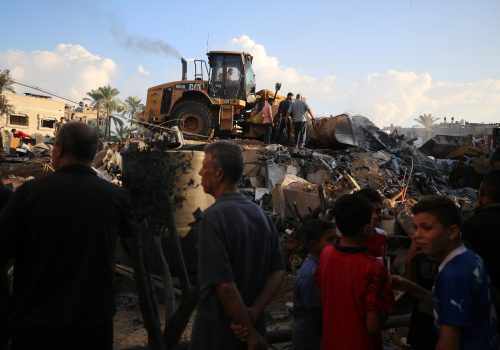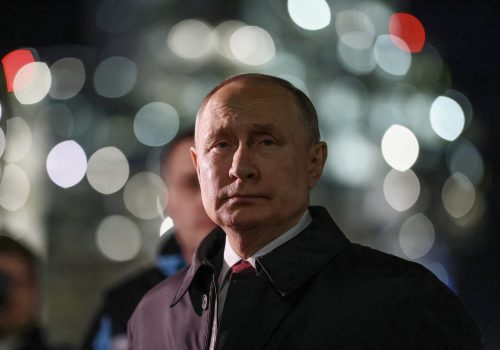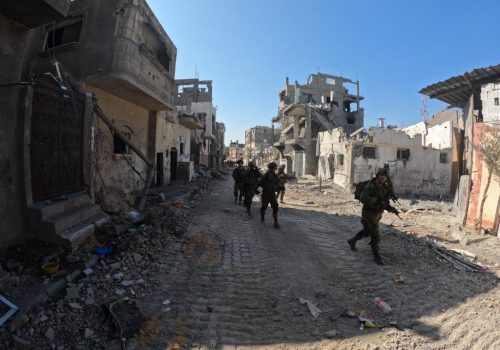Here at the Strategic Litigation Project, our team aims to inject fresh thinking into how governments and practitioners can use legal tools to advance human rights and accountability.
To that end, in recent months the SLP team has continued and built upon efforts to codify the crime of gender apartheid in international law, including by advocating for its inclusion in the United Nations Sixth Committee’s draft crimes against humanity treaty. In partnership with Afghan and Iranian women’s rights defenders and the Global Justice Center, we issued a joint letter and legal brief on the issue, in addition to publishing an explainer in the Atlantic Council’s New Atlanticist and highlighting the campaign in our recent report about existing international pathways toward accountability.
We greatly appreciate your support as we’ve continued to grow our team, scope of work, and ability to effectively seize upon new opportunities. If you wish to support our work further, we hope you will follow our newly-launched X (formerly known as Twitter) and Instagram accounts under the handle @SLPJustice, or donate directly to help fund our projects.
As always, we are dedicated to responding to the evolving needs of human rights defenders, practitioners, and affected communities. If you have ideas for additional lines of work or thoughts on our initiatives, we welcome your feedback.
Kind regards,
International Courts Report
In October, the SLP published its latest report, which aims to provide an overview of and recommendations relating to international options that can be used to pursue accountability for human rights violations committed by the Islamic Republic of Iran (IRI).
The different avenues covered in the report were selected by considering the treaties that have been ratified by Iran, international courts that do or could have jurisdiction over the IRI or relating to violations that take place in Iran, different mechanisms available in which the IRI participates under the United Nations and other international organizations, and mechanisms designed specifically to address issues in Iran. The report ends by looking to the future and highlighting current developments in international law that, if successful, could provide new avenues for accountability.
End gender apartheid campaign
In October, the United Nations (UN) Sixth Committee met to debate its draft treaty on crimes against humanity. Ahead of the meeting, the SLP, in partnership with the Global Justice Center, issued a joint letter and legal brief urging the international community to codify the crime of gender apartheid in the crimes against humanity treaty.
The letter and legal brief were endorsed by dozens of prominent jurists, scholars, and civil society representatives, including Afghan women’s rights defender Shaharzad Akbar and Nobel laureates Shirin Ebadi, Malala Yousafzai, Nadia Murad, and (this year’s honoree) Narges Mohammadi. Also included among the endorsements: South African jurists Justice Richard Goldstone and Navi Pillay, former US Secretary of State Hillary Clinton, former Irish President Mary Robinson, former International Criminal Court Chief Prosecutor Fatou Bensouda, Baroness Helena Kennedy of the Shaws KC, renowned global feminist Gloria Steinem, and more.
On December 5, our co-signatory Malala Yousafzai delivered the twenty-first annual Nelson Mandela lecture in Johannesburg, South Africa. In her speech, she called on governments “in every country” to “stand with Afghan girls and women” and codify the crime of gender apartheid in the UN crimes against humanity treaty.
Want to learn more about gender apartheid?
SLP Director Gissou Nia published a Q&A with the Atlantic Council’s New Atlanticist to explain the letter and brief, how they define gender apartheid, why it should be enshrined as a crime under international law, and how it would be prosecuted.
More recently, Gissou—along with SLP Deputy Director Nushin Sarkarati, Senior Legal and Policy Advisor Alyssa Yamamoto, and incoming team members Sareta Ashraph and Akila Radhakrishnan—wrote for Just Security about the campaign, parallels between South Africa and Afghanistan, and how apartheid differs from other international crimes.
Featured event
In September, SLP Nonresident Senior Fellow Rayhan Asat hosted an event on the margins of the UN General Assembly. The panel, “From holding the line to a robust international response to the atrocities against the Uyghurs,” aimed to reflect upon and examine international action after the UN’s Uyghur report, which was released by the Office of the United Nations High Commissioner for Human Rights last year.
The event featured remarks by US Ambassador-at-Large for Global Criminal Justice Beth Van Schaack, the European External Action Service’s Managing Director for Multilateral Affairs Belén Martinez Carbonell, and Division Head for the German Federal Foreign Office’s Directorate for Asia and the Pacific Peter Loeffelhardt. The panel was moderated by the Economist’s Gady Epstein and featured Rayhan, Former UN High Commissioner for Human Rights Prince Zeid Ra’ad Al Hussein, Amnesty International Secretary General Agnès Callamard, and former Human Rights Watch China Director Sophie Richardson.
Prior to the event, the Chinese mission to the UN distributed a letter to other missions urging their staff to not attend. The letter and the event’s impressive turnout prompted coverage in the New York Times, Bloomberg, Radio Free Asia, and the National Review.
Legal interventions
In November, SLP Nonresident Senior Fellow Nizar El Fakih submitted an amicus curiae brief to the Inter-American Court of Human Rights in case 12.919, García Romero y otros v. Ecuador. This amicus aims to persuade the court to advance a more protective interpretation of the admissibility requirement to exhaust domestic remedies in general. If adopted, it may help advance a criterion that could hopefully greatly benefit the region by allowing victims to effectively seek international protection without an overly formalistic approach to the exhaustion requirement.
The court has developed different interpretations of the said admissibility requirement, and although some significant progress was made in the past, the issue remains disputed. For example, in this case, even when more than eighteen years have passed since the death of the victim, the State of Ecuador insists upon requiring the court to deny the admission of the case, arguing the alleged lack of exhaustion of the domestic remedies by the victim’s loved ones.
In the brief, Nizar argues that the exhaustion of civil claims, constitutional protection actions, and requests of recusal are not needed to fulfill the said admissibility requirement. He also argues that in cases of a criminal nature involving public action crimes, the exhaustion requirement should not be considered without balancing it with the fact that public action crimes require the state, and not the victim, to ex officio develop the internal domestic proceedings.
Read the full brief and a summary of the case here.
Growing our team
We are thrilled to bring on Sareta Ashraph as a senior legal advisor. She is a barrister specializing in international criminal law with expertise in gender-competent and intersectional analyses of the commission and impact of international crimes. Ashraph served as the director of investigations for the UN Investigative Team to Promote Accountability for Crimes Committed by Da’esh/ISIL (UNITAD) and as chief legal analyst for the UN Commission of Inquiry on Syria and the Commission of Inquiry on Libya.
In November, we welcomed Bahar Ghandehari as a junior policy fellow. Ghandehari is an Iranian human rights defender focused on international law, human rights, and Middle East policy. She is the founder of Middle East Matters, which focuses on media journalism and digital human rights campaigns. She is also the advocacy officer at the Syrian Emergency Task Force, where she works on policy, advocacy, and accountability efforts concerning human rights issues and atrocities in Syria.
Akila Radhakrishnan is the SLP’s new strategic legal advisor for gender justice and the outgoing president of the Global Justice Center, where she leads its work on gender equality and human rights. Radhakrishnan has led work on abortion access in conflict, gender in genocide and crimes against humanity, and accountability for reproductive violence. She has briefed the UN Security Council, presented at the International Criminal Court, and regularly advises governments and multilateral institutions.
Featured publications
Stay Updated
Follow us on social media and support our work
Subscribe to our newsletter for quarterly updates on the SLP’s work on prevention and accountability efforts for atrocity crimes, human rights violations, and terrorism and corruption offenses around the world:
Image: Afghan women hold banners and placards during a rally to protest against what the protesters say is Taliban restrictions on women, in Kabul, Afghanistan, December 28, 2021. REUTERS/Ali Khara
